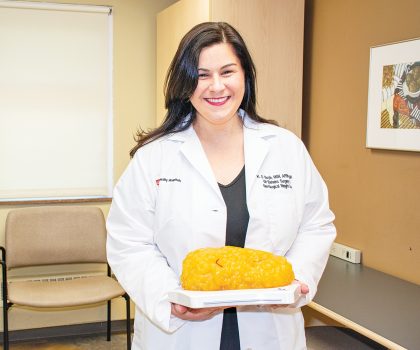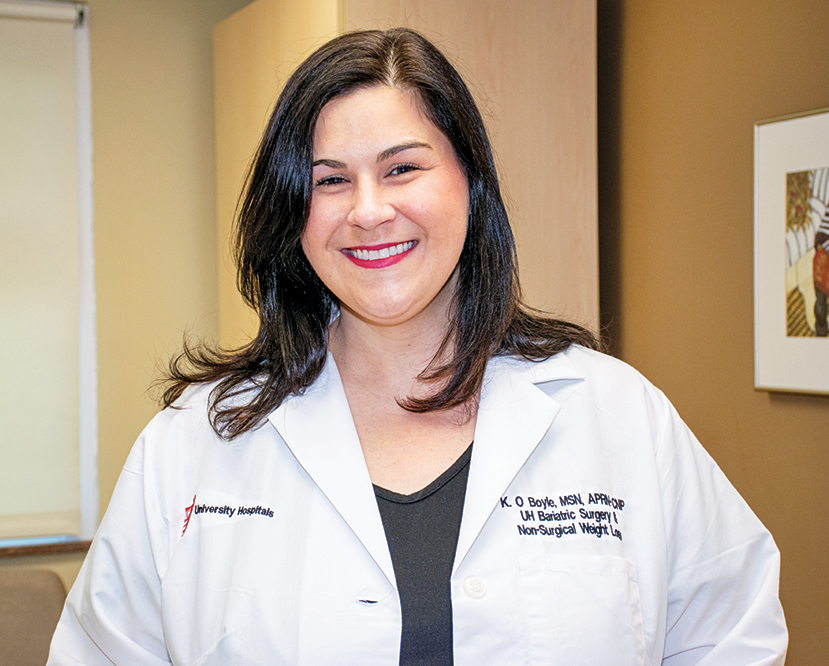With help from the compassionate team at University Hospitals Geauga Medical Center, you can finally lose the weight and keep it off

By Ken McEntee
Being overweight not only can create a barrier to a better quality of life, but it also increases a person’s odds of experiencing major health problems. Katie O’Boyle, MSN, RN, CBN, APRN-CNP, Certified Bariatric Nurse and Associate Nurse Practitioner at University Hospitals Geauga Medical Center, says that unfortunately some people find it more difficult than others to reduce their weight and keep it off.
The understanding team of medical weight loss specialists at UH Geauga Medical Center can help, using medicine and/or surgical based weight reduction methods, Katie emphasizes.
“We see people who are very sick with conditions like uncontrolled diabetes, high blood pressure and high cholesterol, whose doctors have told them that if they don’t make a change, they may die,” she says. “We also see younger people who are still healthy, but whose doctors have warned them that they are likely to become diabetic, have high blood pressure or have a heart attack 10 years down the road if they don’t lose weight.”
Katie, who was named one of the Top 10 nurse practitioners in the country in 2020 by the Point of Care Network, specializes in comprehensive weight management, which includes weight loss with medication as well as surgical weight loss with behavioral modification.
For those who qualify, several surgical weight control options are available. To qualify for bariatric surgery, a person must have a Body Mass Index—a measurement of body fat relative to height and weight—of 40 or higher, or between 35 and 39.9, with weight related conditions, Katie explains.
“Weight loss management is a very individualized thing,” she emphasizes. “Some patients don’t qualify for or are not interested in surgery. If that’s the case, we can sometimes utilize medications as an adjunct to diet and exercise to help optimize weight loss.”
Bariatric surgery involves a variety of procedures that restrict the amount of food a person can eat and/or restrict the calories that a person’s body can absorb.
For example, a gastric sleeve reduces the size of a patient’s stomach to a small pouch to limit the amount of food he or she can eat.
During a sleeve gastrectomy, a surgeon removes 80 to 90 percent of a patient’s stomach, causing the patient to feel fuller faster. Because bariatric sleeve surgery removes the portion of the stomach where hunger hormones are generated, a patient’s appetite is decreased.
A non-surgical option involves the placement of a special balloon into the stomach. The balloon is filled with a water solution to expand, so patients feel full sooner and eat less.
Recent advancements have made bariatric surgery safer and easier, Katie says.

“About 10 years ago, a patient may have had a mid-line incision that was about 12 inches long,” she says. “Today’s surgeries are done laparoscopically and require minimal recovery time. You typically spend a night or two in the hospital and most people are back to work within two to four weeks.”
Discovering the best weight loss option for you is simple, Katie promises.
“A patient will begin with a questionnaire about past diet attempts and his or her history of obesity,” she says. “There are a variety of reasons why we would recommend one surgery over another, but, generally speaking, we allow the patients to have control over what they choose to do. Our job is to work together on a multi-disciplinary approach that gets our patients back on track to be successful for the rest of their lives.”
You can learn more about how weight loss management can change—or save—your life by calling 440-629-4053 or by visiting UHHospitals.org/StartWeightLoss. University Hospitals Geauga Medical Center is located at 13207 Ravenna Road, in Chardon.
